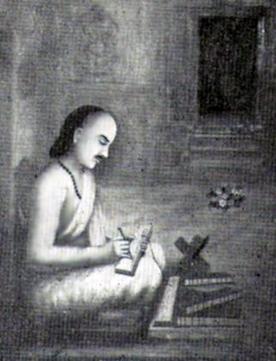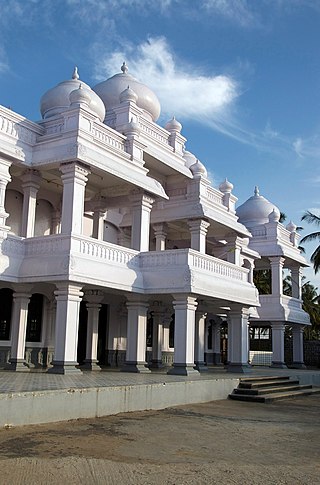
Kannada, formerly also known as Canarese, is a classical Dravidian language spoken predominantly by the people of Karnataka in southwestern India, with minorities in all neighbouring states. It has around 44 million native speakers, and is additionally a second or third language for around 15 million non-native speakers in Karnataka. The official and administrative language of the state of Karnataka, it also has scheduled status in India and has been included among the country's designated classical languages.
Sugama Sangeetha, a variety of Bhavageethe, is an Indian musical genre in which poetry in the Kannada language is set to music. It gained recognition with the work of P. Kalinga Rao in the mid -20th century. Mysore Ananthaswamy and C. Aswath developed the form further in the 1960s and 1970s.

Narayanappa, known by his pen name Kumara Vyasa, was an influential and classical poet of early 15th century in the Kannada language. His pen name is a tribute to his magnum opus, a rendering of the Mahabharata in Kannada. Kumara Vyasa literally means "Little Vyasa" or "Son of Vyasa". He was the contemporary and archrival of the famous Veerashaiva poet laureate Chamarasa who wrote the seminal work Prabhulingaleele covering the lives of Allama Prabhu and other Shiva Sharanas, circa 1435. Both poets worked in the court of Deva Raya II.

Kaiwara is a small town in the Chikkaballapura district of Karnataka state, located approximately 65 km northeast of the state capital Bangalore.

North Karnataka is a geographical region in Deccan plateau from 300 to 730 metres elevation that constitutes the region of the Karnataka state in India and the region consists of 14 districts. It is drained by the Krishna River and its tributaries the Bhima, Ghataprabha, Malaprabha, and Tungabhadra. North Karnataka lies within the Deccan thorn scrub forests ecoregion, which extends north into eastern Maharashtra.

Narahari Tirtha was a Dvaita philosopher, scholar, statesman and one of the disciples of Madhvacharya. He is considered to be the progenitor of the Haridasa movement along with Sripadaraja. Though only two of his scholarly works are extant, they are characterised by their verbosity and lack of digressions. A few songs of his survive under the pen name Raghukulatilaka. As a minister of considerable influence to the Eastern Ganga rulers and later as the pontiff of the Madhvacharya matha, Narahari converted the Simhachalam temple into an educational establishment of renown and a religious centre for Vaishnavism.

Gadag-Betageri is a city municipal council in Gadag district in the state of Karnataka, India. It is the administrative headquarters of Gadag District. The original city of Gadag and its sister city Betageri have a combined city administration. The municipality of Gadag-Betageri has a population of 172,813 and an area of 54.0956 km2 (20.8864 sq mi). Kanaginahal of Gadag is the birthplace of the first co-operative society in Asia. The temples of Veera Narayana and Trikuteshwara are places of religious and historic importance.
Ponna (c. 945) was a noted Kannada poet in the court of Rashtrakuta Emperor Krishna III. The emperor honoured Ponna with the title "emperor among poets" (Kavichakravarthi) for his domination of the Kannada literary circles of the time, and the title "imperial poet of two languages" for his command over Sanskrit as well. Ponna is often considered one among the "three gems of Kannada literature" for ushering it in full panoply. According to the scholar R. Narasimhacharya, Ponna is known to have claimed superiority over all the poets of the time. According to scholars Nilakanta Shastri and E.P. Rice, Ponna belonged to Vengi Vishaya in Kammanadu, Punganur, Andhra Pradesh, but later migrated to Manyakheta, the Rashtrakuta capital, after his conversion to Jainism.

Arakalagudu Narasingarao Krishna Rao, popularly known as Anakru, was an Indian writer. He is one of the best-known writers in the Kannada-language and was popularly known as Kadambari Sarvabhouma. The inception of the Pragatishila ("progressive") movement in Kannada literature is credited to him. He received an honorary doctorate from the Mysore University and is also a recipient of the Karnataka Sahitya Academy Award.

The Unification of Karnataka or Karnataka Ekikarana refers to the formation of the Indian state of Karnataka in 1956 when several Indian states were created by redrawing borders based on linguistic demographics. Decades earlier during British rule, the demand for a state based on Kannada demographics had been made.

Theerthapura Nanjundaiah Srikantaiah commonly known as 'Thee. Nam. Shree., was a Kannada poet, essayist, editor, translator, linguist and teacher. He was awarded the Pampa Prashasthi for his work on the history and tradition of Indian poetics spanning two millennia titled Bharathiya Kavyamimamse. T. N. Srikantaiah was instrumental in preparing and publishing the Kannada version of Constitution of India in 1952. He is credited with the use of the vernacular equivalent of Rashtrapathi for the English 'President', a usage which is still in vogue. Srikantaiah was responsible for guiding the doctoral theses of Kannada litterateurs like S. Anantanarayan and M. Chidananda Murthy. An active participant in the Kannada Dictionary Project, Srikantaiah later laid the foundations for the Post Graduate Department at Manasa Gangotri campus at University of Mysore.

Vijaya Dasa was a prominent saint from the Haridasa tradition of Karnataka, India in the 18th century, and a scholar of the Dvaita philosophical tradition. Along with contemporary haridasa saints such as Gopala Dasa, Helevankatte Giriamma, Jagannatha Dasa and Prasanna Venkata Dasa, he propagated the virtues of the philosophy of Madhwacharya across South India through devotional songs called devaranama written in the Kannada language. An integral part of Kannada Vaishnava devotional literature, these compositions in praise of the Hindu god Vishnu as well as other deities are called dasara padagalu. He has influenced both Carnatic music and Hindustani music through his compositions. His ankita is Vijaya vithala. These compositions can be more specifically categorized as keertanas, suladis, ugabhogas, and simply padas. They were easy to sing to the accompaniment of a musical instrument and dealt with bhakti (devotion) and the virtues of a pious life.

Krishnaraja Wodeyar III was an Indian king who was the twenty-second Maharaja of Mysore. He ruled the kingdom for nearly seventy years, from 30 June 1799 to 27 March 1868, for a good portion of the latter period of which he was merely a nominal ruler. He is known for his contribution and patronage to different arts and music during his reign. He was succeeded by his biological grandson and adopted son, Chamarajendra Wadiyar X.
Narayana Rao or Narayanarao may refer to:

Yelandur Narayan Ravindra, known mononymously by his stage name Avinash, is an Indian actor who appears predominantly in Kannada and Tamil films. He has been working in films for more than three decades. Known for his authentic portrayal of complex characters and versatility, Avinash is one of the most sought actors in the supporting category. He is one of the few actors to enjoy both critical and commercial success.

Madhva Brahmins, are Hindu Brahmin communities in India, who follow Sadh Vaishnavism and Dvaita philosophy propounded by Madhvacharya. They are found mostly in the Indian states of Karnataka, Maharashtra, Goa, Tamil Nadu, Kerala, Telangana and Andhra Pradesh.

Girish Rao Hatwar, popularly known as Jogi, is a Kannada writer and journalist. Being one of the Kannada neo-literature writers, he has written short stories, novels and columns in many Kannada periodicals and daily newspapers. He has also written scripts for television serials, lyrics and screen play for movies. A journalist by profession, Jogi is currently a Magazine Editor of Kannada Prabha daily.














